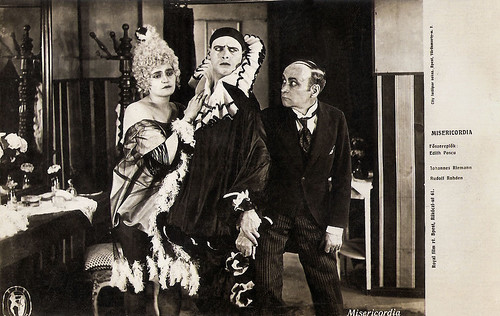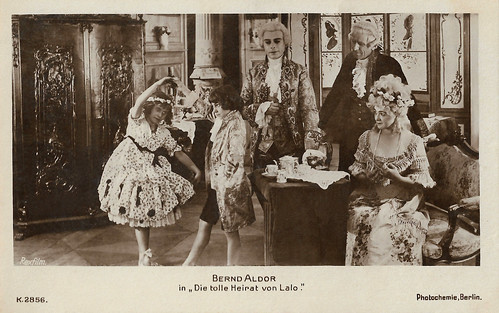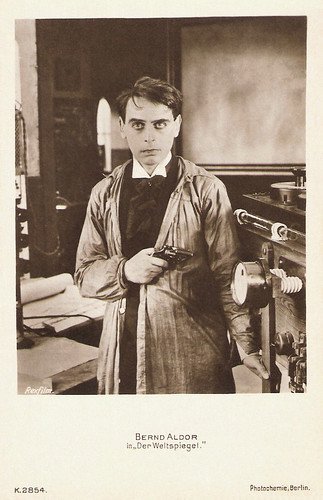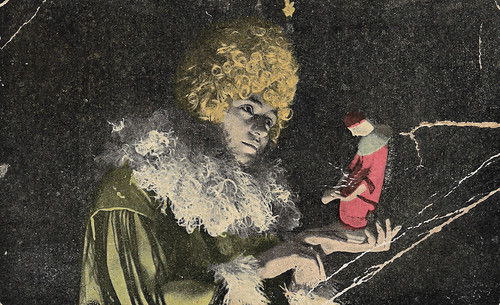
German postcard by Verlag Photochemie, Berlin, no. K. 199. Photo: Alex Binder, 1916.

German postcard by Photochemie, Berlin, K. 2855. Photo: Rex-Film. Bernd Aldor in Die Liebe des van Royk (Lupu Pick, 1917).

Hungarian postcard by City fotóipar soksz, Budapest. Photo: Rex-Film / Royal Film, Budapest. Johannes Riemann, Edith Posca and Rudolph Klein-Rohden in Tötet nicht mehr/Don't kill any more (Lupu Pick, 1919).

German photocard for the album 'Vom Werden deutscher Filmkunst 'by Ross Verlag. Photo: Ufa. Publicity still with Werner Krauss in the classic German Kammerspiel film Scherben/Shattered (Lupu Pick, 1921). The woman is Edith Posca, who plays the daughter.

German postcard by Ross Verlag, no. 115/2. Photo: D.L.S. Werner Krauss in Napoleon auf St. Helena/Napoleon at St. Helena (Lupu Pick, 1929). The outfit of Krauss is that of Goethe in the famous painting 'Goethe in the Campagna' (1787) by Tischbein.
Shaky, toothless old men
Lupu Ludwig Pick was born in Iaşi, Romania, in 1886. His father was a Jewish Austrian merchant and his mother was of Romanian origin. From the age of eleven, he grew up in Berlin. Already in elementary school, he was a member of a theatre group and gave violin concerts. He attended the Sophien-Realgymnasium and completed an apprenticeship as a salesman, but at the same time, he took acting lessons as a member of an amateur theatre group.
In 1909, he joined the ensemble of the Schillertheater in Altona. From 1910, he played at the Sommertheater in Flensburg, where he directed for the first time. There he met actress Edith Posca, whom he married in 1914.
Lupu Pick made his film debut in Japanisches Opfer/Japanese Victim (Adolf Gärtner, 1910) with Max Mack. In 1913, Pick came to the Deutsches Theater in Berlin with a performance of ‘Die Schiffbrüchigen’ (Eugène Brieux), where he experienced his breakthrough in the role of the doctor. He stayed in Berlin and worked for six years at the Kleines Theater Unter den Linden as an actor, director and stage manager. His greatest success was the role of Uncle Eli in ‘Jettchen Gebert’.
Pick usually slipped into the roles of shaky, toothless old men, whom he knew how to embody excellently. After WWI, he only sporadically appeared on the stage, and in 1930, he retired from theatre acting. From 1915 on, Pick worked regularly as a screen actor. After his role in Richard Oswald’s Und wandern sollst Du ruhelos/And You Shall Wander Restlessly (Richard Oswald, 1915), he became a fixture in Oswald’s following films.
He appeared in such classic silent films of the 1910s as Hoffmanns Erzählungen/Tales of Hoffmann (Richard Oswald, 1915), Homunculus (Otto Rippert,1917) starring Olaf Fönss, and Das Bildnis des Dorian Gray/The Picture of Dorian Gray (Richard Oswald, 1917) with Bernd Aldor. He was a regular in films by Conrad Veidt and Reinhold Schünzel and also worked with Gerhard Lamprecht, Henrik Galeen, and Fritz Lang. He appeared in 50 silent films between 1910 and 1928.

German postcard by Verlag Photochemie, Berlin, no. K. 3305. Photo: Rex-Film.

German postcard by Photochemie, Berlin, no. K. 2269. Photo: Berliner Film-Manufaktur. Lya Mara, Erich Kaiser-Titz (background), and Lupu Pick in Die Serenyi/The Serenyi (Alfred Halm, 1918). This is one of two cards Photchemie issued on this film.

German postcard by Photochemie, Berlin, no. K. 2275. Photo: Berliner Film-Manufaktur. Friedrich Zelnik in Die Rothenburger (Lupu Pick, 1918).

German postcard by Photochemie, Berlin, no. K. 2853. Bernd Aldor in Der Weltspiegel (Lupu Pick, 1918). The woman could be Gertrud Welcker.

German postcard by Photochemie, Berlin, no. K. 2856. Photo: Rex-Film. Bernd Aldor in Die tolle Heirat von Laló/The Great Marriage of Laló (Lupu Pick, 1918).
The unchained camera
In 1918, Lupu Pick and Arthur Spitz founded the production company Rex-Film. Pick also became its managing director. He directed entertainment fare like the crime caper Mr. Wu (Lupu Pick, 1918) with Carl Meinhard and Manja Tzatschewa. Pick was socially committed and in 1919 he pleaded against the death penalty in his film Tötet nicht mehr!/No More Killing (Lupu Pick, 1919).
In 1920, Pick collaborated for the first time with author Carl Mayer on Der Dummkopf/The Fool (Lupu Pick, 1921) starring Max Adalbert. Their second feature film was Scherben/Shattered (Lupu Pick, 1921) with Werner Krauss which is today considered the archetypical 'Kammerspielfilm' (Chamber drama film), an intimate drama that offers an intimate, cinematic portrait of lower-middle-class life.
Pick directed his film Aus den Erinnerungen eines Frauenarztes/Flying Shadows (Gerhard Lamprecht, Lupu Pick, 1922) against 'Paragraph 218'. In Germany, abortion is punishable by Section 218 of the German Criminal Code. Pick’s gothic tale Grausige Nächte/Nights of Terror (Lupu Pick, 1921) with Edith Posca, was followed by the acclaimed Kammerspielfilm Sylvester/New Year's Eve (Lupu Pick, 1924), his last film based on a screenplay by Mayer. Both Scherben and Sylvester were innovative in their extensive use of ‘Entfesselte Kamera’ (the unchained camera), using tracking and gliding techniques as opposed to keeping the camera stationary. Both films also didn’t use intertitles.
As an actor, Lupu Pick made another impressive appearance as a cab driver in Die letzte Droschke von Berlin/The Last Horse Carriage in Berlin (Carl Boese, 1926), produced by his company Rex-Film, and as the Japanese diplomat Matsumoto in Spione/Spies (Fritz Lang, 1928). Pick continued to direct films for Rex-Film, including Das Haus der Lüge/The House of Lies (Lupu Pick, 1925), Das Panzergewölbe/Wolves of the Underworld (Lupu Pick, 1926) starring Ernst Reicher and A Knight in London/Eine Nacht in London (Lupu Pick, 1928) with Lilian Harvey. Pick was also heavily involved in film politics. He served on the board of the Film Association of Industrialists (Vorstand des Verbandes der Filmindustriellen), SPIO and the Film Directors Association of Germany (Verbandes der Filmregisseure Deutschlands) and worked intensively to establish the union-based umbrella organization of Filmmakers in Germany (Filmschaffenden Deutschlands - Dacho). He was the organisation's first chairman.
His last silent film was the psychological historical film Napoleon auf St. Helena/Napoleon on St Helena (Lupu Pick, 1929) starring Werner Krauss and made in France. The film was based on an expose by Abel Gance. Pick made only one sound film, Gassenhauer/The Street Song (Lupu Pick, 1931) with Ernst Busch. The film was a considerable public success and one of its songs, 'Marie, Marie', by the Comedian Harmonists, became a hit record. Lupu Pick died unexpectedly in 1931 from a stomach ailment in Berlin. He was 45. His wife Edith Posca took her own life just four months after his death.

German postcard by Ross Verlag, no. 23/1. Photo: Atelier Bieber, Berlin.

German postcard in the Film-Sterne series by Rotophot, no. 508/1. Photo: Messter-Film. Lupu Pick, Henny Porten, and Emmy Wyda in the comedy Höhenluft/Mountain Air (Rudolf Biebrach, 1917).

German postcard by Photochemie, Berlin, no. K. 2854. Photo: Rexfilm. Bernd Aldor in Der Weltspiegel (Lupu Pick, 1918).

Spanish collector card by Chocolat Imperiale, Barcelona, Card 3 of 6. Photo: Rex-Film / Distr. J. Verdaguer S.A., Barcelona. Edith Posca in Tötet nicht mehr!/Misericordia (Lupu Pick, 1919).

German postcard by Ross Verlag, no. 115/1. Photo: D.L.S. (Deutsche Licht-Spiele). Werner Krauss in Napoleon auf St. Helena/Napoleon at St. Helena (Lupu Pick, 1929).
Sources: Filmportal.de, Wikipedia (German and English), and IMDb.
No comments:
Post a Comment